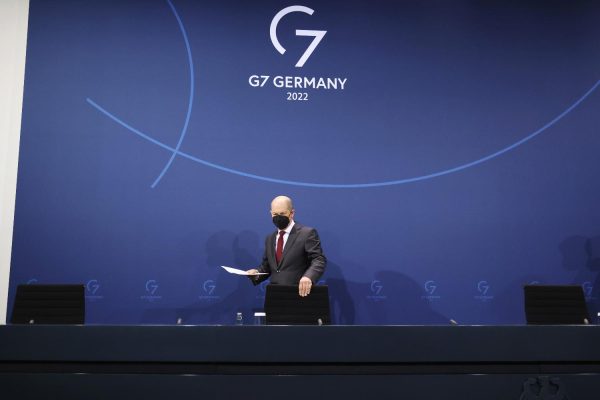
The Financial Times reports that German businesses are steeling themselves to sever links with Russia.
The German government is raising defense spending to €100 billion this year, meeting NATO’s 2-percent norm for the first time in thirty years and giving Germany a larger military budget than Russia. It is buying fifty new warplanes, including the F-35 Joint Strike Fighter.
The government also supports the European Commission’s proposals to make the EU less dependent on Russian oil and gas.
I’m the glass-half-full type, so I want to say better late than never. But Germany really is late in seeing Vladimir Putin for who he is.
About time
Before Putin invaded the rest of Ukraine, he had already annexed its Crimean Peninsula and propped up an insurgency in the Donbas border region.
He interfered in the 2016 American presidential election, funded anti-EU parties in France and Italy, armed the poison regime of Bashar Assad, invaded Georgia and weaponized Eastern Europe’s dependence on Russian oil and gas.
Yet some 3,650 German companies still did business in Russia last year. Germany still imported €33 billion worth of Russian goods and exported almost €27 billion, making it Russia’s third-largest trading partner.
Before the war, hundreds of thousands of containers moved annually between Russia and German ports. According to the Financial Times, that number is approaching zero.
It’s not just business that’s coming to a standstill as a result of Western sanctions and companies voluntarily leaving Russia. Cultural programs, joint scientific research and student exchanges are on hold as well.
It was about time.
Flawed
Germany thought it could change Russia, but its assumptions were flawed. I argued as much in 2016. So did others. Experts and politicians in Eastern Europe understood Putin even better and warned for years that accommodation and trade were not going to moderate his behavior.
I had the chance to study the original Ostpolitik in university, when it was part of my Cold War history class. The central insight I gleaned from historians of the period was that Ostpolitik worked because East Germany and the Soviet Union craved the West’s recognition of the status quo in Eastern Europe. Up until then, West Germany hadn’t even recognized the East as a separate country. Cultural and economic ties across the Iron Curtain helped normalize relations — and they gradually weakened Communism from within, and with it the hold of Soviet Russia on Eastern Europe.
The lesson too many Germans learned was that it’s always better to talk and do business with Russia than stand up to it, even when it became clear Putin’s goal was not to defend the status quo in Europe but to undermine it. Post-Cold War Europe was built on integration in the EU, solidarity in NATO, liberal democracy and the inviolability of national borders. Putin attacked all four.
Mistaken
President Frank-Walter Steinmeier, a leader of Germany’s Social Democratic Party, nevertheless argued there could be no “lasting peace” in Europe without Russia. As foreign minister, he condemned American-led NATO exercises in Eastern Europe as “saber rattling”.
Angela Merkel, the former Christian Democratic chancellor, so neglected the army that it was barely combat-ready by the time she left office. She unwisely phased out coal and nuclear power at the same time, raising Germany’s imports of Russian natural gas. When allies in Central Europe and North America urged Merkel to cancel Nord Stream, she insisted the pipeline — which allows Germany and Russia to bypass Ukraine — was a purely “commercial” project. It wasn’t for Russia. Merkel even resisted applying EU antitrust laws to the pipeline. She lost that argument, but the pipeline was built.
Her predecessor, Gerhard Schröder, another former Social Democratic Party leader, became chairman of Nord Stream as well as the Russian state oil company Rosneft after retiring from politics. He has kept both positions and still appears to believe he can talk Putin out of escalating the war further.
All three were, and in Schröder’s case still are, tragically mistaken.
